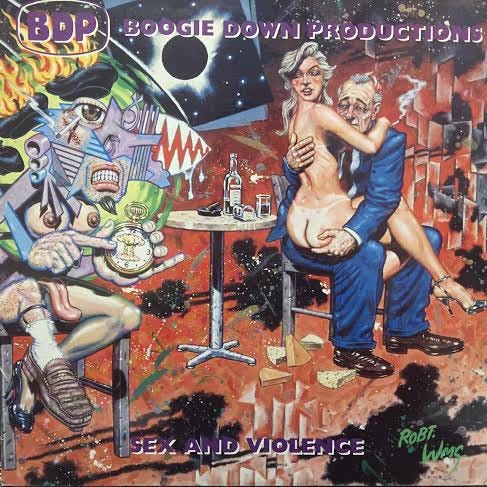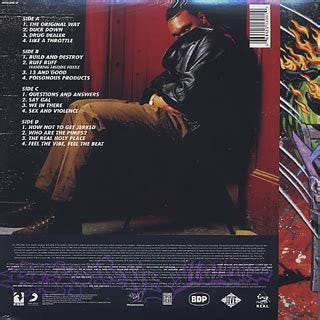The first time I heard anything from the Boogie Down Productions camp, it was via the Stop The Violence Movement and their single Self-Destruction that The Box played in heavy rotation. Over the years KRS-One slowly but surely got on my radar, especially when KRS-One became an internet sensation for fifteen minutes by creating the online site The Temple Of Hip-Hop. His infamous appearance on Def Poetry Jam was also a nice surprise too but it wasn’t until coming across the Behind The Music episode of Salt-N-Pepa that I learned of Boogie Down Productions, particularly Scott LaRock, and later, once digging down the rabbit hole, Ms. Melodie and D-Nice. Sadly, outside an occasional viewing of I’m Gonna Get You Sucka!, of which Boogie Down Productions participated in, I hadn’t thought anything about any of them until the Afrika Bambataa scandal surfaced and KRS-One came back into my rearview defending him.
Now let’s go down the rabbit hole of Boogie Down Productions’ last hurrah, Sex And Violence.
For those of you not hip, numerous issues surrounded the outfit, leading to Sex And Violence indirectly launching a forced solo career of KRS-One and retiring the BDP moniker after its release. The murder of group member Scott LaRock, who died allegedly trying to settle a street beef D-Nice (which led to him being shot) complicated Boogie Down Productions’ recording career; prior to his death a lawsuit started with LaRock and KRS-One with their record label B-Boy Records over unpaid royalties led them to getting a Warner Bros. deal for a hot second. Unfortunately, after hearing of LaRock’s death the label dropped the remaining group, forcing them ultimately sign with Jive Records, where infamous beefs between KRS-One and X-Clan and later PM Dawn (who were at the height of their popularity) speculatively destroyed any label support for Boogie Down Productions and their artists.
Sex And Violence has quite the confusing story to tell. From its picturesque album cover depicting sordid sin and illusion, it stands on straight business as one of the best covers of its day and one of the most beautiful ever made in hip-hop. Unfortunately, the same cannot be said for the album. A commercial failure that sold even less than its predecessor Edumatainment, Sex And Violence went largely ignored by the masses and has largely been forgotten to time. Released in 1992 during the rise of gangster rap, the album is a bitter end of the gritty 1980s New York hip-hop sound that featured a cavalcade of soul classic sample beats over very primitive Roland TR-808 drums that defined the era. Thirty years later Sex And Violence is a mecca cypher masterpiece for battle rappers but KRS-One’s choice of political and social commentary combined with a pissed off delivery make the hip-hop yesteryear album as dated as a Joan Rivers disco joke from the seventies.
KRS-One delivers his twisted lyricism as always, though in retrospect Sex And Violence is the bitter end of his peak as a lyricist. The battle rap fatigue from years of being the hip-hop activist is pretty hard to miss as KRS-One alternates back and forth between extreme James Evans hypertension anger from everything to political and social issues and Rastafarian yelling inflections that struggle to make sense. What just makes this a hard listen is that for all of KRS-One’s pro-Black power to the people delivery, there is far too much ghetto fatherly scolding to make Sex And Violence as enjoyable as the album cover.
Lyrically, KRS-One is like a pissed off Santa Claus making a list and checking it twice, giving everybody from dope pushers, peers he considers to be his lesser, and even the chick that accused Mike Tyson of raping her on Say Gal a stern angry talking to which gets old quick. Don’t get it twisted, KRS-One is still KRS-One, so there will be ample history and religious lessons int eh songs while he’s scolding folks, but the preachiness rubs the album the wrong way this time. There’s also the pesky problem that while KRS-One shouts out his allegiances to various cliques like Flavor Unit, Kenny Parker, Freddie Foxx, Kid Capri, and others, he fails to name names on the battle diss songs which means anyone not old enough to remember or just plain missed the era completely has no idea who or what he is lashing out in rage to some thirty plus odd years later.
Of all of the songs on this album none of them are memorable except 13 And Good.
As one of the released singles from Sex And Violence, 13 And Good is only memorable in part to its controversial music video that is still shocking to watch to this day alongside KRS-One’s unapologetic defense of Afrika Bambataa and his stern attacks against the alleged victims exposing the sexual abuse they claimed they suffered. It’s really hard to listen to 13 And Good and not juxtapose KRS-One’s lyrical positions, especially since the song is virtually KRS-One explaining how he met a chick at a club he thought was either twenty-five or twenty-six but she’s thirteen, which means its statutory rape, but he sleeps with her anyway. The ensuing rollercoaster is that she’s clingy and acting stalkerish, isn’t on the pill, and her policeman father finds out, busts them, beats his daughter black and blue, and then makes KRS-One a proposition that he can sleep with his daughter anytime he likes as long as he can sleep with him too, The lubrication with the gum part paints the clearest picture about that you need to see where the story was going. In light of KRS-One’s fierce defense of Bambataa, 13 And Good sticks out like a torn condom that broke inside of a two dollar prostitute.
For a final album, Sex And Violence already comes off as a KRS-One solo album; the playfulness of earlier BDP albums is gone, with only rage left in its place. There is a far cry of a difference between the light tension of The Bridge Is Over versus the anger at Duck Down. Gone are the enlightened Black consciousness lyricism, now replaced by raging yells of political and social commentary that push the envelope far past the listening audience’s tolerance. Nothing is likeable about the album except for the nostalgia around it, which is unfortunate as Sex And Violence should be heralded as a cult classic hip-hop album just like Criminal Minded.
Instead, it’s just another hip-hop yesteryear album you want to like but just can’t.






Sex and Violence was dope for the time. Bears a second listen.
Krs one is a contradiction. Always has been. A hip hop charlatain.